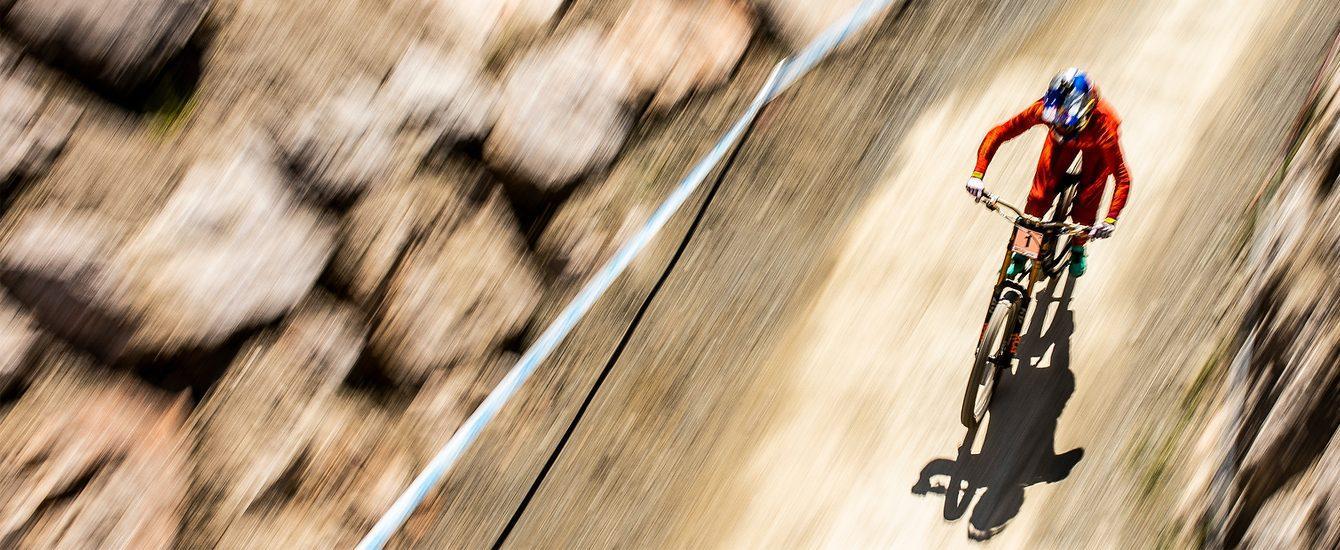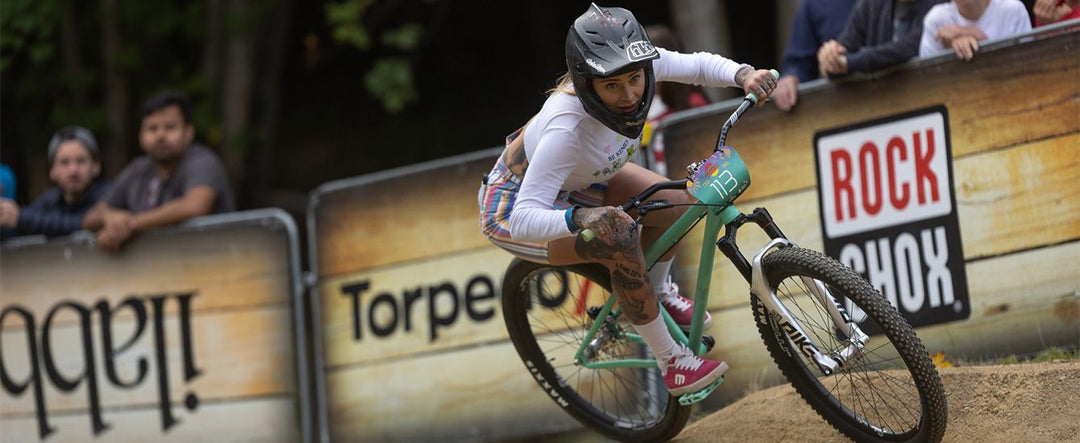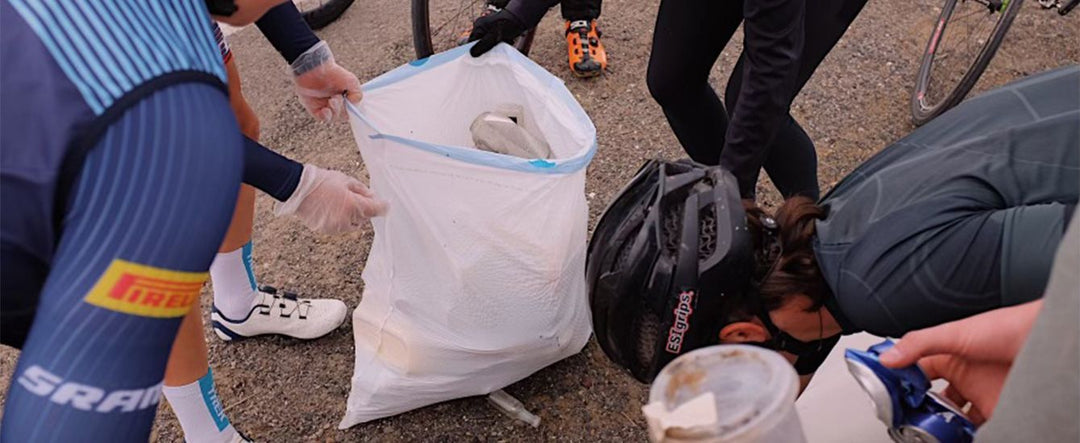BEHIND THE SCENES WITH RACHEL ATHERTON, PART 2: WHAT IT’S REALLY LIKE TO RACE A WORLD CUP

One of the most successful World Cup DH racers of all time, Rachel Atherton spent much of 2019 sidelined with an injury while helping launch her family's new bike company and bike park. For one of the most prolific racers, the chance to step back and watch the sport she loves has been an eye-opening experience. We found her insights into the sport, and what it takes to compete at the very top, absolutely fascinating, and hope you do, too. If you haven't yet, you can read Part 1 of our interview to learn more about the launch of the Atherton Bike brand and the Athertons’ new bike park.
Photos by Sven Martin.

Stan’s NoTubes: We'd talked about your recovery, but what’s it been like being on the sidelines and focused on the new bike company and bike park and not racing World Cups?
Rachel Atherton: While I was watching the TV coverage of the last few Downhill World Cups following my injury, I realized that you can’t really tell from it how hard the racing is--physically and mentally. It always looks easier than it actually is to race like that.
SNT: So when we spectators watch Red Bull TV, we see you on the trainer, then during your run, then a recap of your run. What else is going on?
RA: What you don’t see is how much World Cup Racing takes from you physically and mentally. It’s your whole life. While I’ve been injured and not racing lately, I’ve noticed how much energy I have. I feel like talking to people, and I feel wide awake. When I’m racing during a World Cup, my body is ruined, and I often get sick.
SNT: What about the mental aspect?
RA: For me, race weekends are harder mentally than physically. I start with practice, and I get more and more nervous as the week goes on. On race day, I’m physically sick in the mornings. I feel sick with nerves. In Andorra, I did my practice runs in the morning, and that's when you turn it up a notch. Things are getting dialed, your suspension is getting on point. You get your lines right, do those first couple of runs. And I remember thinking, "It's on." I thought, "I know I can win." Then the nerves kick in, because you know you can do it, but you know just how gnarly it's going to be, how on the edge you have to be to win.
SNT: So that's fascinating. For you, the nerves kick in after you know you can do it. It's not about worrying if you can do it.
RA: Yeah, exactly. It's knowing that this is going to be gnarly. I'm probably going to go over the edge. And then you've got to go, that fight or flight I suppose. I mean you get to the bottom of your run and your whole body, everything is screaming, everything hurts, but you're so heightened, your senses. You can feel everything. You're so alert. You can hear everything and feel your whole body, everything screaming. You get to the finish, and it's just insane. I don’t know how people can follow that up with a party in the evening. I’m so drained afterward. I’ve spent the whole week psyching myself up for a five-minute race run. Although I can see why some people need to party afterward to come down off that. There is a lot of adrenaline that gets produced for your race run. If you can ever harness that, you're going to get through the season pretty strong.  SNT: OK, so what would you add to the coverage of the sport to show us what it’s really like?
SNT: OK, so what would you add to the coverage of the sport to show us what it’s really like?
RA: I would show the few minutes before an athlete wakes up. When all you want to do is stay in bed with no one to disturb you. I don’t believe anyone who says that they wake up excited to race. I’d like to see them show us staring at our breakfast during the morning of the race, unable to eat.
SNT: This year’s been a bit different for you because you were racing on newly designed and built Atherton Bikes. What role has that played mentally on race day?
RA: I normally have a certain amount of trust in the bikes I get to race, but suddenly I’m riding a bike put together by us, a small company. Sure I trusted it, but I wondered . . . will the bike stand up to the test? At first, it was an unproven bike, and I didn’t want to have a bad race season. In fact, the bike has stood up to the test. It was amazing to see how that happened so fast. On the development side, it’s been interesting. I was always thinking about how the bike feels. Every run, I was changing things. In January, the bike didn’t even exist. We got it onto the race track in such a short period of time. The suspension, the linkage . . . everything has been changing. I’d say that I didn’t do two runs on the same setup at all this year.
SNT: I was going to ask you how you stay motivated, but talking to you about launching the bike company and bike park, it's clear there is no shortage of motivation. Is that just how you are?
RA: I think when people say something is going to be hard or that you can’t do it, for athletes, that's what they live on. It's what they thrive on.
SNT: So then is it harder when people don’t doubt you?
RA: Yeah, I think so. You can see that. I'm one of those people that really thrives when things go wrong. Often, that's the way it is, because it makes you focus. You really narrow your perspective, you focus only on what matters, what you can control. When you're quite confident and things go well, often it doesn't translate into the results. I’m not really a believer in the positive mental attitude. I think that sometimes if you’re absolutely in tears, it's all going wrong, you really focus and work hard. That's important, I think, not to get complacent. You can work harder and do better.  SNT: Do you ever listen to music to help you through those moments leading up to the race?
SNT: Do you ever listen to music to help you through those moments leading up to the race?
RA: No, I don’t actually listen to music on race day. I've never really done it. I find it distracts me from my true feelings, really. What I feel is my emotion, and I want to be really in tune with it. I don't want anything to . . . .
SNT: Like change your frequency?
RA: Exactly. I sing a lot, which takes up the mental space, but I don't actually listen to music, and I don't know how people do it. I need to be totally focused and wired. I guess "wired" is the way to describe it. When you leave that starting gate, you're totally clear and ready and don't have anything else in your head. I listen to a lot of music at the bottom, in the pits and stuff, but that hour before, at the top, no. I think that helps you block out all that external stuff. You don't have headphones on. You have to physically block out messages yourself.
SNT: That might be why some wear them, to block out the noise?
RA: Yeah, but then, when they take them off, surely you have this barrage of information, the fans, the track, other riders. I'm quite good at zoning everyone out. You learn how to do it yourself. You don't have any help. But maybe I should try listening to music. I might be better!
NT: Do you think that's possible? To find a way to go faster, find another level, even after everything you've done. Do you have a next level?
RA: There's physical strength. People talk about the girls not being as fast as the guys. When you look at the more technical tracks, the gaps are huge between men and women, probably due to strength. But then, I also think sometimes--from watching Gee’s GoPro footage--that maybe it’s processing speed. It feels like the men can process info faster. I really think that Gee does the processing more quickly than I do.  SNT: Could that be physical strength too, though? Do you think maybe they could be making the same mistakes processing, but physically are able to . . . ."
SNT: Could that be physical strength too, though? Do you think maybe they could be making the same mistakes processing, but physically are able to . . . ."
RA: Hold onto it. Muscle their way out of it.
SNT: I always thought that was a moto thing. Like the people who did more training on motorcycles are used to seeing stuff coming at them fast.
RA: Yeah, because when I've ridden a lot of moto a lot in the winter and ridden a lot of sand tracks, I could physically fell the difference on my downhill bike. I was just stood up, aggressive, really confident, just smashing stuff. And when you don't ride the motorbike a lot, you're much more delicate, you're trying to pick your line, trying to be exact.
SNT: When it comes to levels, your training and physicality, the work you put in, focus, listening to yourself, that has to be on the top level with athlete in any sport in the world.
RA: And when you get a couple of people doing it, then everyone does it, and that's how the level raises. Then to be better, you need to find another level. And so it goes on. Long live mountain biking.  SNT: Thanks so much. Any last thoughts, things you've noticed from this year's unique vantage point?
SNT: Thanks so much. Any last thoughts, things you've noticed from this year's unique vantage point?
RA: Getting to watch it, I think downhill mountain bike racing is probably the best sport in the world, with the machines that we're riding, how technologically advanced they are, the physical side of it coupled with the mental side of it. There’s nothing else like it in the world, really. Not comfortable being bored, Rachel and her brothers have also just launched a bike company and opened a bike park. Check out Part 1 of this interview, with lots more about the new Atherton bikes and Dyfi bike park.






